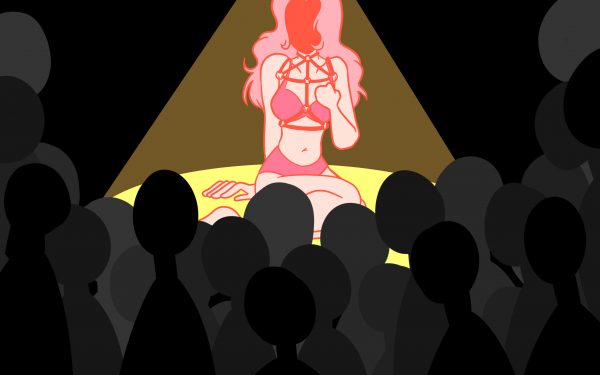Eugenics and Feminism: The exclusion of Black women
Unveiling the dark legacy of the Famous Five
“If they don’t give you a seat at the table, bring a folding chair.” This was said by Shirley Chisholm, the first Black woman to be elected to the United States Congress.
As a Black woman, I have always felt somehow excluded from the feminist movement. Throughout my 22 years of living, I have been perceived as Black first and a woman second. This intersection of sexism and racism is part of daily life for millions of women who look like me—with ancestors perceived and used like objects and seen as possessions.
The history of women's suffrage in Canada, especially during its first wave, is marked by the systemic exclusion of Black women through stark racial and class divisions. The movement catered to a specific demographic: white, Christian and Protestant women.
Despite getting the right to vote simultaneously as every other woman in Canada, the rights and freedoms of Black women were still restricted by virtue of their gender, skin colour and social class. First Nations women were also not granted the right to vote until 1960, and the Indian Act further complicated matters by stripping Indigenous women of their full Indigeneity based on marriage.
Furthermore, this legacy of racism, eugenics, and anti-immigration sentiment was explicit amongst the suffragette movement—which included Canada’s Famous Five.
The Famous Five were a group of influential Canadian women who advanced women's rights in the early 20th century. They initiated the Persons Case, a constitutional ruling that gave women the right to be appointed to the Senate.
This group included suffragists Emily Murphy, Henrietta Muir Edwards, Nellie McClung, Louise McKinney and Irene Parlby. As a result of their work, women were finally addressed as people, but these acclaimed women were not without their flaws.
Despite their work towards feminism, they refused to fight for women of colour, promoted white supremacy and were staunch supporters of eugenics.
Eugenics is a racist and ableist scientific theory, described by the National Human Genome Research Institute, as the belief in "racial improvement" by "improving the human population through controlled breeding."
In the early 20th century, Alberta's feminist movement, including the efforts of the Famous Five, championed “Maternal Feminism” and “Political Motherhood.” This form of feminism was tied to the belief in eugenics and white supremacy. Maternal Feminism emerged as white settler Canadians were trying to form a distinct identity post-World War I Canada to differentiate themselves from European influences. This new identity was envisioned to be nurtured by mothers, considered the guardians of this “white race.” These efforts were focused on a vision of a future Canadian identity as neurotypical, able-bodied and predominantly white, favouring Anglo-Saxon Protestants.
This period was marked by a surge in social reformers concerned with issues like prostitution, child labour and poverty. Maternal feminists sought solutions in public health, religious instruction, and temperance, aiming to “protect” white women. The Famous Five were part of this movement, and their activism in women's political rights was intertwined with these reform efforts.
Emily Murphy, under her pseudonym Janey Canuck, penned Black Candle, a racist anti-drug treatise that unjustly targeted Chinese immigrants, African Americans and other minorities. Racism and classism are persistent throughout her work. In her book, she provocatively states, “Still, it behooves the people of Canada […] to consider the desirability of these visitors—for they are visitors—and to say whether or not we shall be ‘at home’ to them for the future.”
Her writings under this alias also revealed her eugenic beliefs. For instance, in a Vancouver Sun column, she wrote, “we protect the public against diseased and distempered cattle. We should similarly protect them against the offal of humanity.”
Murphy advocated for eugenics, championing both selective breeding and the active sterilization of those she deemed "inferior" in society. She labelled "mentally defective" children as societal burdens and a strain on state resources.
She also argued against the rights of visible minorities and people with disabilities to reproduce. “Some of the opponents to the Sterilization Act had a good deal to say about private liberty, quite forgetful of the fact that social necessity is of infinitely greater moment. Since I know of no way of driving home a nail other than by hammering it, let me emphasize again that insane people are not entitled to progeny.”
The influence of the Famous Five extends beyond racist literature as they were actively involved in promoting eugenic policies within Canada.
As members of the United Farm Women of Alberta, McClung, Murphy and McKinney played major roles in advocating for and passing resolutions on immigration control as well as compulsory sterilization, aiming to "check the inflow of the mentally weak and degenerate immigration from Europe."
By involving themselves in broader social reform movements, the Famous Five infused racist and classist policies that manifested in support for eugenics aimed at “improving” the Canadian population.
These fascist policies were supported alongside restrictive immigration measures like the Chinese Head Tax to control the racial makeup of the Canadian population.
Many more laws were created to push the anti-immigration and pro-eugenics policies.
Laws like the Sexual Sterilization Acts of 1929 in Alberta and 1933 in British Columbia, passed under the guise of these beliefs, enabling government-run institutions to sterilize people. Those sterilized included minority groups like disabled people, Indigenous children and Black women without their knowledge or consent.
These actions not only perpetuated white supremacy but also controlled the Black population through coerced sterilization, often without informing the women that the procedure was irreversible.
The Eugenic feminism of the Famous Five is contradictory.
Feminism advocates for equality, yet eugenic thought breeds superiority. This undermines the core principles of feminism, as it promotes inequality and is entrenched in white supremacy.
The legacy of these laws is still evident in the 21st century, manifesting in the forced sterilization of Native American women. Eugenics in Canada continue to target people of colour and disabled individuals, in order to eliminate "undesirable" traits.
This history casts a shadow over the legacy of the Famous Five and it raises a crucial question: While the Famous Five made significant contributions to women's rights in Canada, can their involvement in eugenics and racial purity agendas be overlooked?
With files from Anthony Issa.
This article originally appeared in Volume 44, Issue 10, published February 13, 2024.

_1_900_626_90.jpeg)




_600_375_s_c1.png)
_600_375_90_s_c1.jpg)